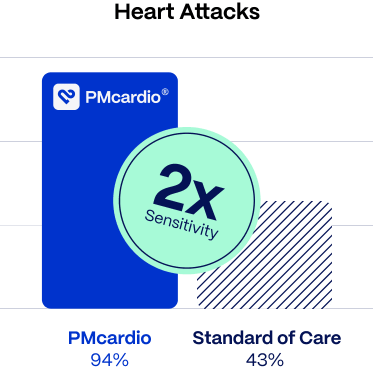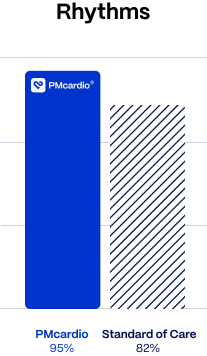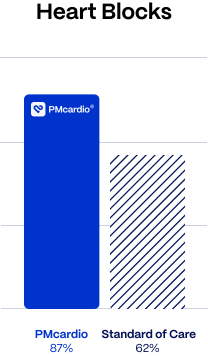PMcardio Supported Diagnoses
Validated across millions of ECGs. Used by 100,000+ clinicians worldwide.


























PMcardio supports 49 Different Conditions, Including Critical Hidden Heart Attacks.
Rhythms
- Sinus bradycardia
- Sinus rhythm
- Sinus tachycardia
- Paced rhythm
- Atrial fibrillation
- Atrial fibrillation with rapid ventricular response
- Atrial fibrillation with slow ventricular response
- Atrial flutter
- Atrial flutter with rapid ventricular response
- Atrial flutter with slow ventricular response
- Supraventricular tachycardia
- Suspected junctional rhythm
- Suspected junctional bradycardia
- Suspected accelerated junctional rhythm
- Wide QRS rhythm
- Idioventricular rhythm
- Wide QRS tachycardia
Available in:
Myocardial Infarctions
- STEMI / STEMI Equivalent
Includes detection of STEMI equivalents (i.e. posterior STEMI, hyperacute T-waves, etc.). Negative for STEMI mimics (i.e. early repolarization, LVH, etc.).
Available in:
Conduction Abnormalities (Heart Blocks)
- 1st degree AV block
- 2nd degree AV block, type Wenckebach
- Higher degree AV block
- Complete right bundle branch block
- Incomplete right bundle branch block
- Complete left bundle branch block
- Incomplete left bundle branch block
- Nonspecific intraventricular conduction delay
- Left anterior fascicular block
- Left posterior fascicular block
- Bifascicular block (RBBB + LAFB)
- Bifascicular block (RBBB + LPFB)
- Trifascicular block (RBBB + LAFB + AVBLOCK1)
- Trifascicular block (RBBB + LPFB + AVBLOCK1)
Available in:
Axis
- Left cardiac axis deviation
- Right cardiac axis deviation
- Extreme cardiac axis deviation
- Normal axis
Available in:
Measurements
- Heart rate
- P wave
- PR interval
- QRS duration
- QT interval
- Corrected QT interval (Framingham formula)
- RR interval
- PP interval
Available in:
Other Supported Diagnoses
- Suspected long QT syndrome
- Suspected short QT syndrome
- Suspected atrial enlargement
- Suspected ventricular hypertrophy
- Premature complexes
Available in:
Research Models Available for Select Partners and Internal Use.
Research Models
- Reduced Left Ventricular Ejection Fraction (LVEF)
- STEMI Criteria
- STEMI Culprit Vessel Location
- Subendocardial Ischemia
- Median Beats
- Serial ECG Comparison
- Hyperacute T-waves (HATW)
- Advanced ECG Measurements (>100 fiducial points)
- ECG Signal Quality Indicators
- Lead Reversal Detection
Available in:
Currently Unsupported Diagnoses
Not Supported Diagnoses
- Asystole
- Movement artefact
- Suspected Electrode Reversal
- Sino-Atrial Exit Block (and its different types)
- Sick sinus syndrome
- Sinus pause
- Digitalis intoxication
- Pericarditis
- Pericardial effusion/tamponade
- Myocarditis, Pulmonary embolism
- Brugada Syndrome
- Bundgaard syndrome
- Ashman Phenomenon
- Electrolyte imbalances (including Hyperkalemia, Hypokalemia, Hypercalcemia, Hypocalcemia, Hypermagnesemia, and Hypomagnesemia)
- Hyperthyroidism
- Hypothyroidism
- Hypothermia (Osborn wave)
- Raised intracranial pressure
- Arrhythmogenic cardiomyopathy (ACM, arrhythmogenic right ventricular cardiomyopathy (ARVC) – epsilon waves)
- Low QRS voltage
- Poor R-wave progression
- Persistent S-waves
- Dextrocardia
- Other medication intoxication
- Any other not explicitly supported diagnosis
Proven Impact. Measurable Results.
See how PMcardio outperforms standard care in real clinical settings with up to 2× higher sensitivity in detecting heart attacks. Validated in 15+ external, independent studies.



Helping Clinicians Diagnose ECGs With Confidence


“PMcardio’s STEMI AI ECG Model leverages decades of our ECG morphology research to accurately distinguish acute occlusions from patterns which mimic them, going beyond mere ST-elevation analysis.”


”PMcardio has fundamentally changed how we manage chest pain in the ER. With AI support, my team and I feel more confident making critical ECG decisions within seconds, especially in the out-of-office hours.”


“PMcardio lets me know in seconds whether to head for the closest ED or drive straight to a primary PCI-capable cath lab. Getting a STEMI verdict at first medical contact saves those crucial minutes—and when it’s heart muscle on the line, every minute counts.”


“I feel so passionately that we should embrace the opportunity and adopt innovation like PMcardio that gives near-perfect accuracy for detecting diagnoses such as Atrial Fibrillation in primary care.”


“After implementing PMcardio, we noticed a clear drop in false cath lab activations. The AI accurately flags occlusions while minimizing noise from STEMI mimickers, saving time, resources, and spared patients unnecessary procedures.”











